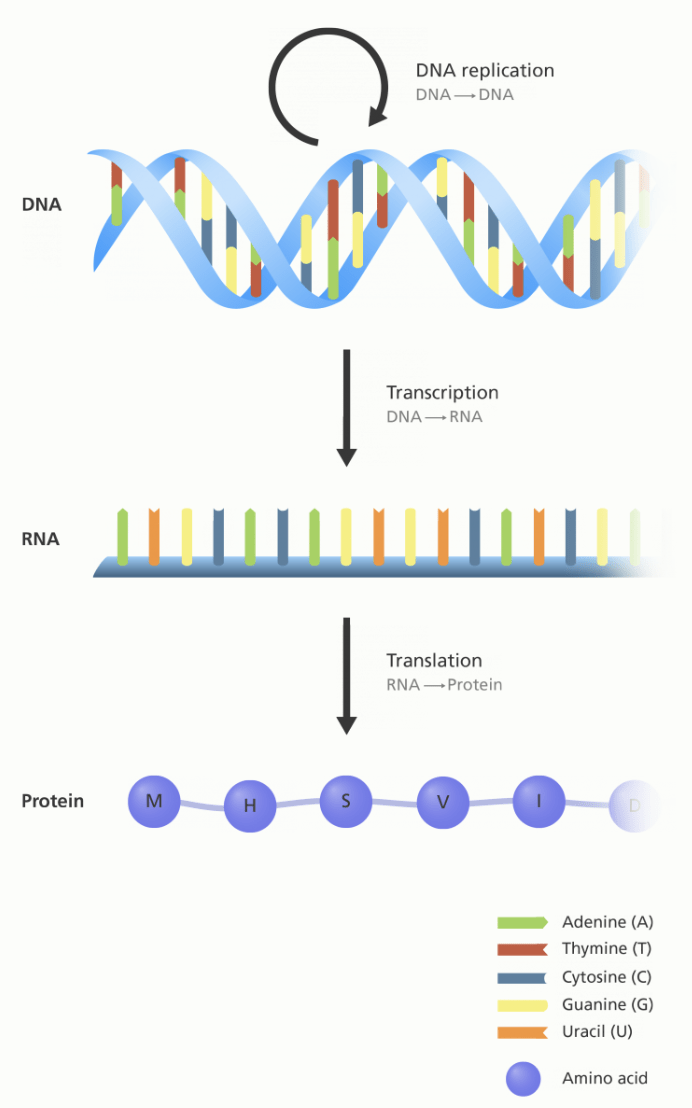
Misleading: The article’s portrayal of mRNA as “cancer drivers” leaves out a significant amount of context. mRNA is essential for life and a normal component of cells.

FULL CLAIM: “Scientists at Sloan Kettering discover mRNA inactivates tumor-suppressing proteins, meaning it can promote cancer”; “The information carrying molecule, messenger RNA, can instruct human cells ultimately in the same way as cancer drivers, playing a major role in causing cancer to thrive while inactivating natural tumor-suppressing proteins the human body creates to save you from cancer. This is the complete opposite of what the CDC and the vaccine manufactures are telling everyone right now about the Covid vaccines, and this is based on clinical research by molecular biologists at the Sloan Kettering Institute.”
REVIEW
An article published by Natural News on 2 March 2021 claimed that COVID-19 RNA vaccines will cause cancer, as mRNA “can instruct human cells ultimately in the same way as cancer drivers”. The article cited a study published by researchers at Memorial Sloan Kettering in 2018 as evidence to support its claims[1]. The article was republished by other outlets, such as Planet Today, whose copy received more than 8,000 interactions on Facebook, according to social media analytics tool CrowdTangle. Natural News has been recognized as an outlet that promotes health misinformation and conspiracy theories.
Below, this review explains why the claims within the article about messenger RNA are inaccurate and misleading, and also demonstrates that it grossly misrepresented the findings of a research study conducted at Memorial Sloan Kettering Cancer Center.
Messenger RNA is a normal component of cells and essential for life
The article’s claim that messenger RNA “can instruct human cells ultimately in the same way as cancer drivers” lacks a significant amount of context that may mislead readers into believing that the function of mRNA is to drive cancer development. This is false and demonstrates a fundamental misunderstanding of the role of mRNA in the body. In fact, mRNA is critical to protein production in cells. And given that proteins are involved in all chemical reactions that keep us alive, mRNA is indispensable for life.
DNA carries genetic information, which contains instructions for how to make proteins. However, DNA doesn’t interact directly with the protein-making machinery in cells. Instead, that role falls to mRNA. In the nucleus, which houses the DNA, the instructions encoded by DNA are copied (transcribed) into mRNA. The mRNA then travels out of the nucleus, carrying the instructions to the protein-making machinery, known as ribosomes. At the ribosomes, the instructions carried by mRNA are decoded, culminating in the assembly of amino acids to form a protein.
The flow of information from DNA to RNA to protein is known as the central dogma of molecular biology. The concept was first proposed in 1958 by Francis Crick, whose work, along with that of James Watson, Rosalind Franklin, and others, led to the discovery of the double-helical structure of DNA.

Figure 1. An illustration of the central dogma of molecular biology. Image credit: Genome Research Limited.
Overall, the article’s characterization of mRNA as a “cancer driver” leaves out a significant amount of context that illustrates its importance for life. In fact, Memorial Sloan Kettering updated the press release on the study cited in the article to make the following clarification:
“It’s important to note that mRNAs are a normal component of all cells and the specific ones discussed here are not involved in mRNA-based vaccines, like the one developed against SARS-CoV-2.” [emphasis added]
Cancer study by Memorial Sloan Kettering researchers examined modifications to RNA produced by the human body
The study by Lee et al. cited in the article was published in the scientific journal Nature in 2018[1]. The Natural News article claimed that it showed “mRNA inactivates tumor-suppressing proteins, meaning it can promote cancer”.
This description is inaccurate and misrepresents the study’s findings. The study didn’t show that mRNA inactivates tumor-suppressing proteins. Instead, it examined how mRNA that was modified by the body in a particular manner produced non-functional tumor suppressor proteins.
After DNA has been transcribed into mRNA, the mRNA molecule still needs to be modified in certain ways so that it can travel safely to the ribosomes. There exists several types of modifications, which take place during a process called post-transcriptional modification, and can alter the properties of mRNA[2]. For example, they can change how long a particular mRNA molecule persists in the cell before it breaks down, and even alter the function of the protein that it codes for. Scientists have recognized the significant influence that post-transcriptional modifications have on development and health.
Lee et al. specifically examined modified mRNA that had been copied from tumor suppressor genes in patients with a type of blood cancer called chronic lymphocytic leukemia (CLL). According to the American Cancer Society, CLL is the most common form of leukemia in adults. Tumor suppressor genes encode proteins that regulate cell division. When these proteins fail to work properly, it can lead to uncontrolled cell division, which is the defining characteristic of all cancers[3].
Mutations in DNA are a common reason for tumor suppressor proteins to stop functioning correctly. Curiously, “CLL cells have relatively few known DNA mutations. Some CLL cells lack even known mutations”, as stated in the Memorial Sloan Kettering press release.
But Lee et al. observed that the modified mRNAs, which had been copied from tumor suppressor genes, often produced truncated proteins, or proteins with missing parts. And this was sufficient to interfere with their ability to regulate cell division, even if the tumor suppressor gene itself didn’t have mutations. Note that the researchers didn’t find that the modified mRNA inactivated pre-existing, normal tumor suppressor proteins, as the article claimed. Rather, changes made to the mRNA altered the function of the protein that the mRNA coded for.
As the Memorial Sloan Kettering press release reported, these observations helped to explain “a long-standing conundrum” about CLL, and that “In effect, the mRNA changes that Dr. Mayr’s team discovered could account for the missing DNA mutations.”
The study’s senior author Christine Mayr concluded in the press release:
“The changes to the mRNA make proteins that are very similar to the proteins that are made when you have a mutation in the DNA that causes a truncated protein to be made […] In the end, the outcome for the cell is very similar, but how it happened is very different.”
Finally, the modified mRNAs that researchers examined in the study are unrelated to the mRNA in the COVID-19 vaccines, since they originated from and were modified by human cells, without external intervention.
The COVID-19 mRNA vaccines carry instructions for producing the spike protein of the virus that causes COVID-19, SARS-CoV-2. This gives the immune system an opportunity to learn to identify the virus, without having to run the risks associated with getting COVID-19, like respiratory difficulties and persistent health problems. This concept is akin to police showing the mugshot of a wanted criminal to the public. As the proverb goes, “forewarned is forearmed”—by equipping the immune system with prior knowledge of the virus, the body can mount a defense against a natural infection much more quickly, thereby reducing the likelihood of disease.
REFERENCES
- 1 – Lee et al. (2018) Widespread intronic polyadenylation inactivates tumor suppressor genes in leukemia. Nature.
- 2 – Zhao et al. (2016) Post-transcriptional gene regulation by mRNA modifications. Nature Reviews Molecular Cell Biology.
- 3 – Hanahan and Weinberg. (2011) Hallmarks of Cancer: The Next Generation. Cell.


